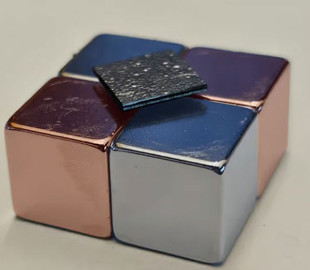
Magnetic levitation is widely used for frictionless sliding in toys, appliances, hardware and even trains (maglevs). But all this works from external power sources and sometimes very powerful ones, if we are talking about superconducting magnets for levitating trains. With permanent magnets it is a little easier, but there are limitations. Scientists from Japan tried to combine both magnetic effects in one device and something came out of it.
For their research, scientists from the Okinawa Institute of Science and Technology (OIST) took ordinary graphite. This material is known for its diamagnetic properties. He can acquire magnetization in the induced magnetic field and thanks to it, he acquires the ability to levitate over magnets for a while. This property appears together with the appearance of eddy currents in the material. True, these currents are quickly exhausted due to the high conductivity of graphite, but this is correctable.
The Japanese put graphite crumbs in a shell of silicon oxide, which is an excellent dielectric. Then, with the help of wax, they created plates with an area of 1 cm 2 from such grains. By giving the platforms magnetization, they created the conditions for levitation over permanent magnets. Thanks to the good current insulation of the graphite grains in the material, the eddy currents in them did not die out for a long time, providing the samples with a sufficiently long levitation without external power supply.
In trains on magnetic cushions, such material is unlikely to appear. Still, there is a different level of energy and power. But this technology can find application in sensors – forces, acceleration and others. Even sensors with feedback are possible, although in these cases power will have to be used. However, it will be possible to increase the sensitivity of measurements up to the point of use in quantum systems, scientists are sure.

